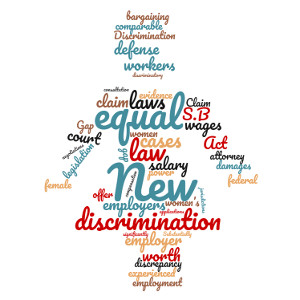Equal Pay Laws in New Jersey
The Gender Pay Gap in New Jersey
 On Equal Pay Day 2018, Governor Phil Murphy vowed to sign what he termed “the most sweeping equal pay legislation in America.” Is this just a politician’s bravado, or does in mean real change for New Jersey families?
On Equal Pay Day 2018, Governor Phil Murphy vowed to sign what he termed “the most sweeping equal pay legislation in America.” Is this just a politician’s bravado, or does in mean real change for New Jersey families?
Senate Majority Leader Loretta Weinberg (D-Bergen) is the primary sponsor of Senate Bill 104, a/k/a the Diane B. Allen Equal Pay Act. According to sources, Governor Murphy delayed the signing so that Sen. Weinberg could attend the signing ceremony. The new equal pay act, which has over two dozen co-sponsors, has broad support in both houses. S.B. 104 cleared the Assembly 72-4 and the Senate 35-0. Diane Allen is a retired State Senator who experienced pay discrimination firsthand earlier in her life.
One of the biggest changes is that S.B. 104 significantly expands the “substantially similar” analysis that’s common in equal pay legislation. This law employs a comparable worth analysis that extends beyond job descriptions at individual places of employment. For example, auto detailers are arguably worth about the same as housemaids. Five other U.S. jurisdictions also have comparable worth laws on the books. Furthermore, the new law has a treble damages clause. Some successful claimants may be eligible for three times their lost wages as a form of punitive damages.
According to the latest statistics, women’s wages are roughly 20 percent lower than men’s wages. Equal Pay Day is the day in the year that men’s and women’s salaries equalize.
Why is There a Pay Gap in New Jersey?
For various reasons, women have unequal bargaining power when it comes to initial salary negotiations. Because of this discrepancy, over two-thirds of female employees take the first salary offer. They do not even attempt to negotiate. As a result, men and women often begin their careers on unequal footing in terms of their compensation. That inequity remains and expands over time.
Most employers offer percentage raises. 10 percent of $10,000 is a lot more than 10 percent of $9,000. About the only way to close the gap is for the lower-paid worker to convince the boss to give her a higher raise. Lots of luck with that.
There are a number of resources designed to even this bargaining power and thus erase the pay gap. But for thousands of New Jersey female workers, it is probably already too late. The pay discrepancy has already become entrenched. Gov. Murphy has proposed banning salary history questions. That move, which several other states have already made, would be a significant boon for workers.
However, the strongest laws in the world are basically useless unless there are assertive attorneys to enforce them in court.
Your New Jersey Pay Discrimination Claim
Pay discrimination victims must first establish a prima facie claim for relief. If they do not produce substantial evidence on all key elements, a New Jersey judge may throw the matter out of court. The primary elements in a pay discrimination case are:
- Covered Employer: With some exceptions, S.B. 104 applied to all employers regardless of size. Many other equal pay laws only apply to employers with more than a certain number of workers, such as twenty or even fifty.
- Substantially Similar: As mentioned earlier, the New Jersey equal pay law defines this phrase extremely broadly. Two positions may not be substantially similar if they have different educational or other requirements.
- Gender-Based Inequality: Generally, if even one man in a substantially similar environment earns less than a woman, and the employer has no valid defense, relief is available under the law.
There are several federal equal pay provisions, most notably the Equal Pay Act and Title VII of the Civil Rights Act. In some cases, a federal claim is preferable to a state law claim. In many other cases, the opposite is true. Your attorney should make the call.
Your New Jersey Pay Discrimination Claim
The Merit Defense
If the employer has a merit-based pay system, liability for an equal pay violation may not attach in civil court. In general, equal pay laws do not define this phrase. So, New Jersey courts generally approve any system which:
- Has a formal, written structure,
- Uses predetermined criteria,
- Is mostly mathematical or mechanical in its applications, and
- Has absolutely no discriminatory intent.
Typically, the employer has the burden of proof on every element of this defense. If there is a lack of evidence on even one point, the defense is inapplicable.
Beginning in 2018, New Jersey pay discrimination cases may be easier to win. For a free consultation with an experienced New Jersey Wage Discrimination Attorney, contact Castronovo & McKinney, LLC. We do not charge upfront legal fees in these cases.
Aside from being an absolute pleasure to work with…Tom was quick and efficient with the work he performed. Highly recommended.
